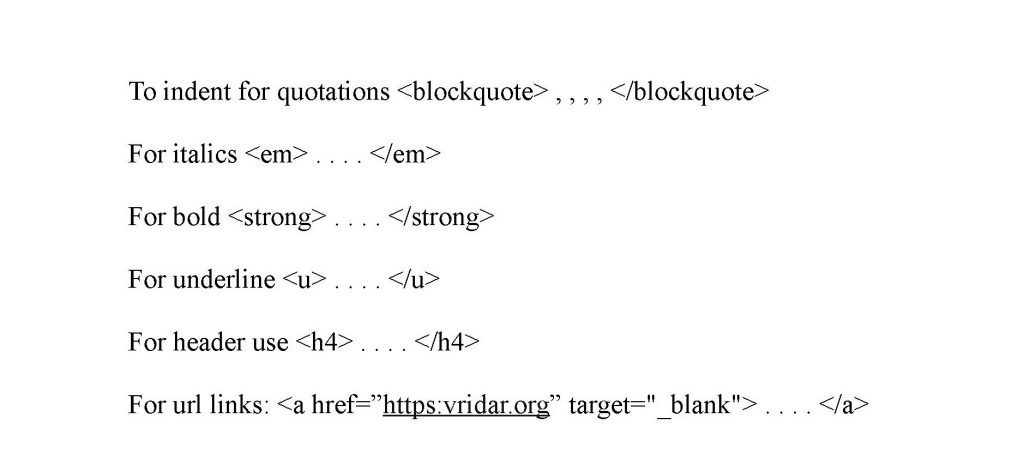Technical:

And for bullet points:

Guidelines and Moderation
While I welcome diverse opinions and critical challenges, abusive comments, persistent preaching and ongoing comments that attempt to use this blog as a platform for agendas that are inconsistent with this blog’s purposes may be (probably will be) removed.
By preaching I mean include advocacy for mysticism and spiritualism or such whether or not the reader defines what they are doing as “preaching” or what they are advocating as “religion”.
.
See /2012/08/16/new-comment-policy-whats-all-this-then/ — New Comment Policy —
.
Freedom of Speech
First of all, before anyone brings up the subject of human rights and freedom of speech, let me be clear: We’re all for freedom of speech in the public square. But this isn’t the public square. It’s Neil’s blog. Since its inception Vridar has permitted open commenting — you don’t have to wait for approval, unless you’re on the list of spammers who get sent to the trash heap right away or on the roster of off-topic windbags, copypasta commandos, and attention-whores who have to pass muster first. We don’t intend to change the policy.
Neil and I like comments. We don’t want to write in a vacuum, and we certainly don’t want to set ourselves up as knowledge-transmitters like certain scholars who would much rather talk than listen. You certainly don’t have to agree with us. Is there anything more boring that talking to somebody who thinks exactly the same way you do?
So I think we’ve been really tolerant for the most part. Unfortunately, that leniency has often come back to bite us when certain people abuse the privilege. It’s a problem we’ve needed to address for some time. We need to get a handle on comments.
New Rules
Vridar is not my blog. I’m just a lazy roommate who sleeps on the couch, leaves his stuff lying around, and steals beer out of the fridge. So to earn my keep, Neil has asked me to start helping moderate comments. I said I’d be glad to, as long as we can agree on the rules.
- All decisions are final. If your comment is denied, go publish it somewhere else.
- No abusive language. We get to decide what’s abusive language. We’re not impartial judges.
- No threats of any kind. No exceptions.
- Your comment must be relevant to the current post. If you want to publish a tract on your favorite scholar or pet theory, get your own blog. There’s a vast Internet out there.
- If you can’t be interesting, at least be brief. If your comment is excessively long and and extremely dull, it will probably be denied. If your comment is really, really long and is not broken up into paragraphs, it will definitely be denied. Seriously, if you don’t have time for minimal proofreading, or if you’re too busy to break your wall of text into paragraphs, then we don’t have time to read it.
- Do not repeat your points. If you feel very strongly about a particular subject, start your own blog. Squatters are not welcome.
- Fairness is not an issue. If you think your comment was unfairly denied, you may be right. On the other hand, see rule 1.
We’ve already started the process. Neil and I began filtering comments yesterday. If yours aren’t showing up, or if they disappear suddenly, now you know why.
Tim Widowfield
- 8. Regularly just posting an “I agree” or “I don’t think so” or “that’s interesting” or type of comment, with no actual argument or new pertinent information, or regularly merely expressing a political or religious partisan opinion (or links to ideological/propaganda and such sites with more opinion than evidence based argument) as opposed to argument will probably result in your comments being deleted. (The wording of this rule is broad: if in doubt, see #7.)
Neil Godfrey
I was wondering what formatting is permitted in the comments? Probably you have a note on this; but I have not been able to locate it. Pardon me if I experiment?
u list?
underline and italics
bold
heading3
Allowed HTML tag names:
• a
• abbr
• acronym
• blockquote
• cite
• code
• del
• em
• i
• q
• s
• strike
• strong
• pre
See: “HTML Code Comments”. WordPress.org.
• Test pre
This text preserves
both spaces and line breaks
• Test q
• Test pre: FAILED
Spaces were not preserved and only 1 line break was preserved, rather than 2.